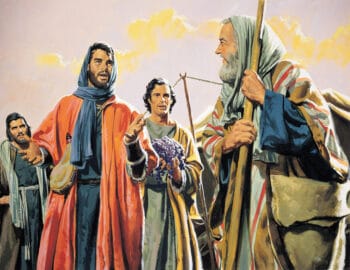 November 16, 2025
November 16, 2025
 Joseph – Faith That Carries You Through
Joseph – Faith That Carries You Through
Devotions from the Life of a Dreamer with Character
 19.When God Changes the Season
19.When God Changes the Season
How God Leads Joseph – and Us – Into New Life Chapters
 Daily Bible Verse
Daily Bible Verse
“He changes times and seasons; He removes kings and sets up kings; He gives wisdom to the wise and knowledge to those who have understanding.”
Daniel 2:21
──────────────── ────────────────
────────────────
 Introduction
Introduction
The night before, Joseph had still heard the key turning from the inside of his cell. The cold stone walls were familiar, the rhythm of prison life ingrained in him. He didn’t expect any change—least of all such a sudden one.
But at dawn, a voice woke him: “Joseph! Get up! Pharaoh is calling you!”
What had remained unchanged for years changed in an instant.
This was often the case in Joseph’s life: seasons seemed to drag on forever—the years as a slave, the long days in prison—and then came God’s moment, turning everything around. When the door opened, it wasn’t just a new task—it was a whole new chapter in God’s plan.
──────────────── ────────────────
────────────────
 Joseph’s Journey: Through God’s Changing Seasons
Joseph’s Journey: Through God’s Changing Seasons
1. The Long Winter
The years in Potiphar’s house and in prison felt like an endless winter for Joseph. He served faithfully, but with no prospect of change. Yet in hindsight, we see: God used this time to strengthen him—in integrity, self-control, and faith.
2. The Sudden Spring Day
One morning the call came. No warning, no days of preparation—just a moment that changed everything. That’s often how God’s timing works: slowly prepared, but suddenly revealed.
3. The Inner Transformation
Before Pharaoh stood not a bitter prisoner, but a man who had learned to give God the glory: “It is not in me; God will give Pharaoh a favorable answer.” (Genesis 41:16)
The external shift was only possible because the internal transformation had already happened.
4. The Assignment in the New Chapter
God didn’t elevate Joseph just to reward him or to free him out of pity, but to place him in a key position—for the protection of many people. Every change of season in God’s plan serves a purpose greater than our personal gain.
──────────────── ────────────────
────────────────
 What Can We Learn From Joseph?
What Can We Learn From Joseph?
-
Faithfulness in the Small Prepares You for the Great
Joseph served in Potiphar’s house and in prison with the same dedication he later showed in the palace. -
Character Matters More Than Talent
His gift of interpreting dreams opened doors—but his solid character kept him in them. -
Patience in Waiting
Even when he was forgotten, he held on to God and trusted that God’s timing is best. -
Forgiveness Instead of Bitterness
When he had the power to take revenge on his brothers, he chose reconciliation. -
Humility Despite Promotion
Even as the second-most powerful man in Egypt, he said: “It is not in me; God will give you the answer.” -
God is Greater Than Our Plans
His dreams came true—but as part of a much bigger rescue plan for many people.
──────────────── ────────────────
────────────────
 Practical Steps for Our Own Season of Change
Practical Steps for Our Own Season of Change
-
Faithfulness Today – The day in the palace often begins with years of hidden faithfulness.
-
Cultivate Inner Readiness – Stay spiritually awake, even when nothing visible seems to happen.
-
Entrust the Past to God – It shapes us, but it must not bind us.
-
Focus on God’s Mission – The new always serves His plan.
──────────────── ────────────────
────────────────
 Practical Questions for Reflection
Practical Questions for Reflection
-
Where do you see parallels between Joseph’s transition from prison to palace and your own life chapters?
-
What from your “old season” is hard for you to let go of?
-
What habits or attitudes do you need now to remain faithful in the new?
──────────────── ────────────────
────────────────
 Prayer
Prayer
Lord,
Thank You that, just like with Joseph, my times are in Your hands.
Help me to be faithful when it is quiet—and ready when You open doors.
Let me release the old without bitterness,
and receive the new with humility and obedience.
Use me in every season for Your glory.
Amen.
──────────────── ────────────────
────────────────
 Key Thought of the Day
Key Thought of the Day
God’s change of seasons often comes suddenly—
but He has been preparing you quietly for a long time.
──────────────── ────────────────
────────────────
 Blessing to Close
Blessing to Close
The God who turned Joseph’s prison into a throne room
is still the same today.
He knows your yesterday, He shapes your today,
and He holds the right moment for your tomorrow.
When He calls,
your heart will be ready.
──────────────── ────────────────
────────────────
LumenCorde | Daily light for a living soul.


 (
(
